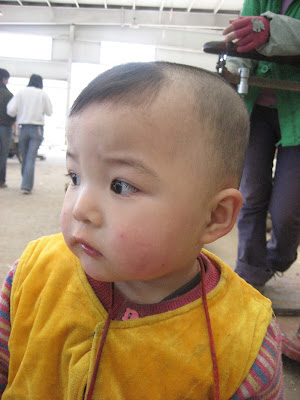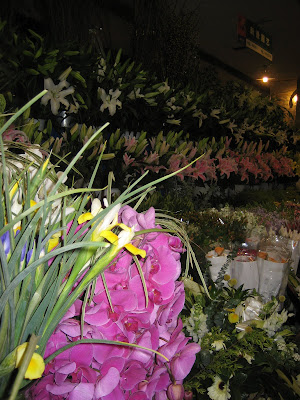Now if only someone would address the issue of adult males peeing roadside and children relieving themselves where ever and when ever the need strikes, we'd be all set...
Read the following article to learn a little about what daily life is like here. One of the boys in Jack's cub scout den said he just learned the 5
th tone of mandarin
Chinese (there are 4 tones). He then proceed to make a throat clearing, hocking sound... Sad but true.
I've seen the
queuing up volunteers. Yesterday at a pharmacy it took 3 tries before I got my turn to pay for my items. Two people just walked right up alongside me and paid for their items.
NYTimesApril 17, 2007
By
JIM YARDLEYBEIJING, April 16 — For all the expectations and civic pride that Beijing has attached to being the host of the 2008 Summer Olympics, the event is a source of civic anxiety, too. What if traffic is terrible? What if the weather is bad? These are worries for any host city, but Beijing also has a few more:
What if foreign visitors are forced to navigate a minefield of saliva left by local pedestrians spitting on sidewalks? What if lines at Olympic events dissolve into scrums as local residents jump to the head of pack? What if Chinese fans serenade rival teams with the guttural, unprintable “Beijing curse”?
China’s ruling Communist Party has never been very comfortable with the question, what if? While Olympic visitors will undoubtedly be greeted with ecstatic hospitality, local officials are worried about some local habits. So as Beijing is building new sports stadiums, subway lines, futuristic skyscrapers and public parks for the Games, city leaders are also trying to rebuild
Beijingers.
Citywide campaigns are trying to curb public spitting, discourage public cursing and littering and also promote lining up. There is even a campaign to rectify the often hilariously bad English translations on signs and restaurant menus. Given that Chinese leaders regard the Olympics as a milestone event to showcase China to the world, they obviously do not want to be embarrassed.
“Public awareness of manners needs to be improved,” said Wang Tao, the soft-spoken, exceedingly polite civil servant who has become a local celebrity for his efforts to curb public spitting.
Last week, the city commemorated “Queuing Day,” an event held on the 11th of every month because the date symbolizes an orderly line. Volunteers wearing satin Queuing Day sashes shooed rush-hour commuters into lines at busy subway stations, while hospital administrators and a few city officials handed out long-stemmed roses to patients who stood in line to pay their bills or pick up medicines. Local news media swarmed the event.
“This is to encourage people,” said
Zhang Xin, 30, an expectant mother, clutching her flower as she left Beijing Hospital after her pregnancy checkup.
Chen
Chunfang, one of the hospital administrators, summed up the purpose succinctly. “The Olympics are coming, and everyone wants to show their best,” she said.
Beijing, of course, is a sophisticated city that is the cultural and political capital of China. Nor it is alone is being accused of public boorishness; some people have even accused, say, New Yorkers of occasional displays of foul language and unflattering public behavior.
Still, some Communist Party officials have publicly fretted that Beijing may not measure up. One delegate at the country’s annual political meetings in March recommended heavy fines and a public education campaign to curb spitting, cutting ahead in line, smoking and foul language.
“They are stubborn diseases that stain the image of the capital city,”
Zi Huayun, the delegate, told the country’s English-language newspaper, China Daily.
In fact, Beijing had already announced that people caught spitting in public before the Olympics could face fines up to 50 yuan, or about $6.50, hardly small change in China. Mr. Wang, the anti-spitting activist, said the Olympic spirit inspired him to begin his campaign. “I felt I must do something to contribute,” he said.
He chose a very dirty task. Public spitting is a frequent practice in Beijing and even more common elsewhere in China. (The sinus-clearing,
phlegmy pre-spit hawking sound is so common that one foreigner wryly dubbed it “the national anthem of China.”) Health officials, worried about communicable disease, have long tried to curb public spitting, with limited success, given that many people do not consider it unacceptable behavior.
“I spent six months trying to figure out how to stop people from spitting,” Mr. Wang said. “I first wanted to wipe their spit up myself, but just how much could I wipe? So I decided the best way was to ask the spitting person to stop.”
He chose to begin in May 2006 in
Tiananmen Square, which might qualify as an official venue if spitting were an Olympic event. “The first person I came across was a thin man, not very tall,” Mr. Wang recalled. “I said, ‘Mister, please wait a second!’ But he walked away and I
couldn’t keep up.”
His campaign has since gained momentum. He has attracted hundreds of volunteers for his group, known as the Green Woodpecker Project. They carry tissues, which they offer to people as an alternative to spitting on the ground, and try to convince the offender, usually male, to change his ways. Mr. Wang himself carries a small camcorder and posts spitting action shots on his Web site.
“Woodpeckers pick up worms and clean up the forest,” Mr. Wang said. “I want to clean up the city the same way.”
Beijing’s mangled English signage is not so much a bad local habit as a local institution in the eyes of resident foreigners. English translations on signs are considered fashionable and good advertising, as well as a gracious gesture to foreigners baffled by Chinese characters. But until recently, the attention paid to the accuracy of the translation was, at best, uneven. Consider that a local theme park about China’s ethnic minorities was initially promoted in English as
“Racist Park.”
David Tool, an American who teaches analytical thinking at Beijing International Studies University, recalled attending a Peking Opera performance in 2001 that offered a running digital translation in English.
“They had this line that should have said ‘auspicious clouds in the sky’ but it read ‘auspicious clods,’ ” Mr. Tool recalled. He said a group of foreigners in the audience erupted in laughter, which he found offensive, even though he was also offended by the bad English.
Mr. Tool and a prominent retired professor, Chen Lin, are now at the vanguard of Beijing’s English police, an effort emboldened by the Olympic self-improvement campaigns. City officials have enlisted the two scholars and other experts to
retranslate the bad English translations on signs around the city. Last week, Beijing announced new standards and official translations that can be used on more than 2,000 different types of signs, as well as on menus.
Mr. Tool said he spent his weekends visiting different businesses as if he were a detective in a linguistic vice squad. “I go in and I say the Olympics are coming and this sign is wrong,” Mr. Tool said. He then sends an e-mail message with a correct translation or has a printout delivered.
He is writing a book on the subject, and no wonder: regular blunders include typos on menus in which the ‘b’ in crab becomes a ‘p.’
Some translations are trickier, like describing pullet, which is a hen less than a year old but appears on some menus as Sexually Inexperienced Chicken. Mr. Tool said one prominent sign had become a regular photo op for foreigners: the Dongda Anus Hospital.
Mr. Tool intervened. It is now the
Dongda Proctology Hospital.
Score another gold medal for Beijing’s self-improvement campaign.

























 At the wet market on Tuesday William, the two Ayis and I came across the child at the top of this post. The child is a girl! This is the traditional way the Chinese cut their children's hair. This explains why EVERY Chinese person we meet thinks Huck and Jed are girls. They would never let their sons' hair be long, even the girls usually have short hair too but sometimes you see longer hair.
At the wet market on Tuesday William, the two Ayis and I came across the child at the top of this post. The child is a girl! This is the traditional way the Chinese cut their children's hair. This explains why EVERY Chinese person we meet thinks Huck and Jed are girls. They would never let their sons' hair be long, even the girls usually have short hair too but sometimes you see longer hair.
 On Friday, Xing Ayi, Xiao Shang (the driver), Huck and I went to a flower and fish market where we had some artwork and photos framed and chose some fish. Huck chose a blue Beta fish and we also bought some pleckos, one of which was dropped on Huck's head by the saleswoman... Only in CHINA!!!
On Friday, Xing Ayi, Xiao Shang (the driver), Huck and I went to a flower and fish market where we had some artwork and photos framed and chose some fish. Huck chose a blue Beta fish and we also bought some pleckos, one of which was dropped on Huck's head by the saleswoman... Only in CHINA!!!

 A week ago, Sunday, we went to the Chabad to make matzah. It was a beautiful day, so I thought I'd show what a somewhat blue sky looks like. Huck is yelling in the photo b/c the sun was too bright for him. It's great to live in China, such a "foreign" place, for lack of a better word, and still be able to live a normal life and do normal activities. I have these moments about once every couple of weeks when I've been living what seems like a pretty average, normal life and then something happens and it reminds me "holy cow, I live in CHINA!"
A week ago, Sunday, we went to the Chabad to make matzah. It was a beautiful day, so I thought I'd show what a somewhat blue sky looks like. Huck is yelling in the photo b/c the sun was too bright for him. It's great to live in China, such a "foreign" place, for lack of a better word, and still be able to live a normal life and do normal activities. I have these moments about once every couple of weeks when I've been living what seems like a pretty average, normal life and then something happens and it reminds me "holy cow, I live in CHINA!"


